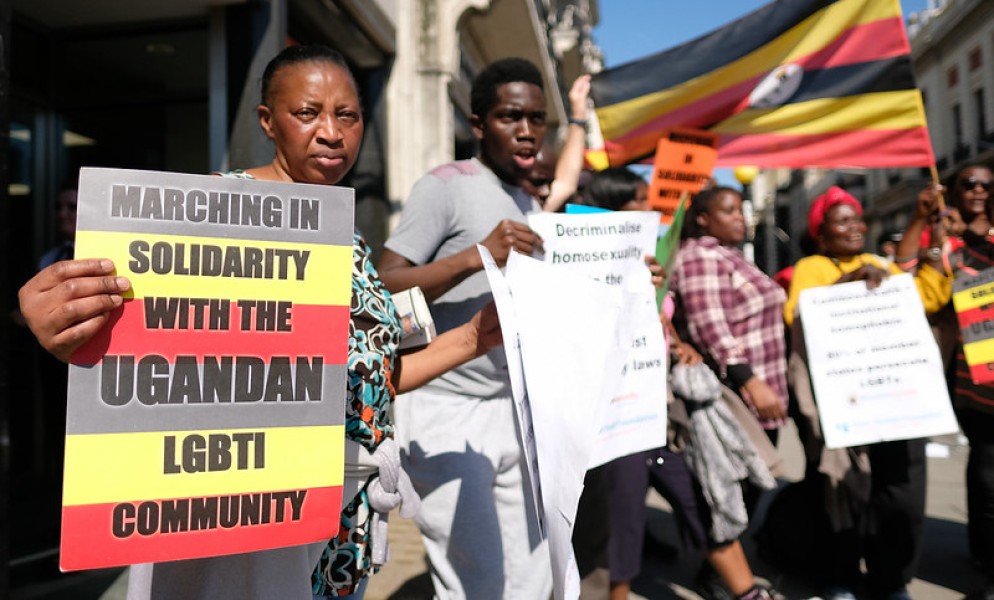On March 21, the Ugandan Parliament passed the Anti-Homosexuality Bill, adopting the harshest anti-LGBTQ+ law in the world. Under it, homosexuality is punishable by life imprisonment, while "aggravated homosexuality" is punishable by death. The bill outlaws the "promotion of homosexuality" and imposes criminal sanctions on anyone who "advertises, publishes, prints, broadcasts, distributes" material that might be regarded as promoting or encouraging homosexuality. A person convicted of this offense is liable to 20 years of imprisonment. Needless to say, if the bill becomes law, it will have a devastating impact on LGBTQ+ individuals in Uganda, who already will live in constant fear of arbitrary detention, discrimination, and persecution.
On April 26, President Yoweri Museveni declined to sign the bill into law and sent it back to Parliament requesting that it revise several provisions, including those that provide for the death penalty and punish property owners who rent to LGBTQ+ individuals. The Parliament’s Legal and Parliamentary Affairs Committee is now reviewing the bill to address the president’s concerns.
The Anti-Homosexuality Bill violates several regional and international human rights treaties that Uganda has signed, including the International Covenant on Civil and Political Rights and the African Charter on Human and Peoples Rights. The bill also violates Uganda's own constitution, which guarantees the right to equal protection under the law, as well as the rights to privacy and nondiscrimination and the freedom of expression, association, and assembly.
Uganda's anti-gay laws date back to the British colonial penal code, which was codified in the 1950 Penal Code. The code severely punishes same-sex acts, which it classifies as "unnatural offenses."
But Uganda also has a recent history of enacting anti-LGBTQ+ laws. In December 2013, the Parliament passed the Anti-Homosexuality Act of 2014, which similarly criminalized same-sex relationships. Fortunately, the Constitutional Court later overturned this law due to a lack of quorum on the day it was passed. Since then, there have been repeated attempts to reintroduce comparable bills, often at the behest of right-wing groups, including intolerant religious groups that provide financial support to lawmakers who in exchange promise to push for anti-LGBTQ+ legislation. Regrettably, Uganda's political leaders often use anti-gay propaganda to distract citizens’ attention from structural political and economic issues and governance challenges.
Since the bill’s passage on March 21, there has been an uptick in cases of violence against LGBTQ+ persons in Uganda. According to a report by the Human Rights Awareness and Promotion Forum, between March 21 and April 20, there were over 59 reported cases of arrests, evictions, and assaults of LGBTQ+ persons for reasons related to their sexual orientation and gender identity.
The Anti-Homosexuality Bill not only threatens the rights of LGBTQ+ persons, it undermines and erodes Uganda’s commitment to human rights. Ugandans must reject norms and beliefs that perpetuate discrimination and persecution against members of the LGBTQ+ community. This would unequivocally signal progress towards a just, inclusive, tolerant and accountable society. A goal that Uganda undertook, not least, when endorsing the 2030 Agenda for Sustainable Development.
Civil society in the country must promote the acceptance, respect, and inclusion of all individuals, regardless of their sexual orientation or gender identity. For its part, the international community must condemn the proposed legislation and take necessary steps to persuade the president of Uganda not to sign it into law.
_______________
PHOTO: On April 19, 2018, demonstrators gathered in London to protest the refusal of the Commonwealth Conference to deal with the issue of laws criminalizing homosexuality and penalizing members of LGBTQ+ community in member countries, including Uganda. (Alisdare Hickson/Flickr)

